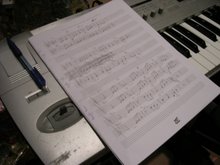 I tried to beat the rain by heading to the pasar malam straight at six thirty o’clock. Though it was merely six thirty, yet the pasar malam was already crowded with people.
I tried to beat the rain by heading to the pasar malam straight at six thirty o’clock. Though it was merely six thirty, yet the pasar malam was already crowded with people.I purchased a packet of rice with a curry chicken and a vegetable dish.
“Tiga tujuh dik,” the old man said. I thought I heard wrongly and begged him to repeat the price.
“Tiga tujuh,” this time he sounded really impatient.
3 dollars and 70 cents for a curry chicken and a vegetable dish? Doesn’t that sound a little steep? Then I saw one of the people purchasing 3 packets food, one chicken, one curry cockles and one huge packet of vegetable. She passed him a five dollar bill and he gave her 1 rinngit in return. I chuckled and wondered whether should I be surprised or not.
As I walked down I was very much attracted to a murtabak stall due to the aroma and fragrance from the fried murtabak. I decided to buy 2, one with chicken fillet and the other beef.
He told me to wait for a while as he was frying more fresh murtabaks for the other customers who have already crowded around to buy more. While he was frying the murtabaks, one of it slipped off his grill as he scooped it up, falling onto the frying pan at a relatively greater velocity, spilling out all its content. He quickly pushed the spilled out fillet back into the murtabak and pretended that nothing happened.
Then his assistant whispered something to the person holding the grill, and they both smiled.
I had a terribly bad feeling about that, and I heard a voice from inside telling me to walk away while I still could.
But it was my stubborn self that rooted myself to the very spot I was standing from the very beginning. In no time to come I regretted my very actions.
He scooped the broken murtabak onto a brown oil paper and placed another one on top of it. Swiftly wrapping up the brown oil paper and putting it inside a plastic bag, he looked at me and handed me the plastic bag.
I was at the tip of my tongue to curse him.
Contrary to what I intended to do, I smiled and paid him courteously. Stuffing the change inside my pocket, I walked away whistling and humming.
No point getting angry, I realised. This is the very price I’m paying for a disease that I’m suffering from. A sickness that cannot be cured, a syndrome that creates disgust among normal people, a little problem that causes a lot of discomfort when I’m in the crowd.
Doctors call it the social albinism.
Now I know what it feels like to be different, to be deemed unworthy and to be looked down upon. Though I am perfectly normal physically, sociologically I am a terminally ill patient. Living in a city of which forts are built by the military of the royalties, I am looked upon as a shrewd beggar or an impoverished musician, roaming from town to town hoping for some loose cash and some sympathetic attention.
But I don’t need any. They see me as a shrewd beggar and yet they swindle me off the little I have. They perceive me as an impoverished musician, yet refusing to listen to the melodies that they have never heard. Locked in their castles and fortresses, they have shut themselves from the progressing world beyond the high walls and iron gates of their cities.
Carrying my food and walking back to my little shed, I realise that I am not alone. There are many more people that suffer from social albinism just like me.
No point in getting mad with them, I thought. Getting angry won’t solve the situation.
Normal people try to treat and cure us, but they failed to realise – just as their doctors have – that it is not the discoveries of vaccines and medication that will treat this disorder, but the eyes of those that see us that have to be treated. In the very first place, social albinism was neither a disorder nor a disease, but they made it one.
+of+DSCN4615+copy2.jpg)


No comments:
Post a Comment